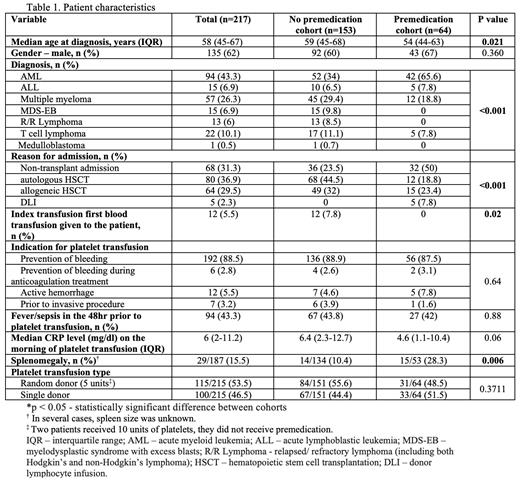Introduction: Platelet transfusions have reduced the incidence of major hemorrhagic complications among hemato-oncological patients, however they are associated with potential complications, including transfusion reactions. The efficacy of premedication with steroids and/or antihistamines prior to platelet transfusion in preventing transfusion reactions has been studied. However, to the best of our knowledge, the effect of premedication on platelet increment has not been previously addressed. We aimed to assess the impact of premedication on platelet increment after platelet transfusion.
Methods: We conducted a prospective study among adult patients admitted to the hemato-oncology and bone marrow transplantation (BMT) units in a tertiary medical center. Enrolled patients, who received a platelet transfusion during their admission, had a complete blood count taken 1-hour post platelet transfusion completion. The decision whether to administer premedication and the specific medications were left to the discretion of the attending physician.
Single donor platelets or 5 pooled random donor platelets were provided by the blood bank interchangeably according to inventory level.
The primary outcome was platelet recovery, defined as the difference between the 1-hour post- and pre- transfusion platelet counts. Adequate platelet recovery was considered >10,000/µL. Secondary outcome was platelet survival, defined as the difference between platelet count 18- to 24-hours post- and pre- transfusion.
Rates of post-transfusion reactions and premedication complications were recorded. Association of other clinical variables with outcomes of interest was evaluated and variables significantly associated with adequate platelet recovery response (p<0.05) were entered into a multivariable analysis.
Results: Overall, 68 patients were enrolled, with a median age of 58 years (interquartile range [IQR] 45-67) and 43 (63%) were males. The most common diagnoses were AML (n=24, 35%) and multiple myeloma (n=23, 34%). Most patients (72%) were admitted for a BMT (autologous 47%, allogeneic 25%).
Outcomes were recorded in response to 217 platelet transfusions, with a median number of platelet transfusion per patient of 4 (IQR 3-5). Premedication was given prior to 64 transfusions (29%), consisting of steroids in 17 (27%), antihistamines in 4 (6%), or both in 43 (67%) platelet transfusions. In 153 (71%) platelet transfusions, no premedication was given. Patients who received premedication were younger, more often had a diagnosis of acute leukemia and were mostly admitted for non-transplant admissions. ( Table 1).
Median platelet recovery and survival for all platelet transfusions were 15,000/µL (IQR 10,0000-22,500/µL) and 8,000/µL (IQR 4000-14,000/µL), respectively.
There was no significant difference in median platelet recovery and survival between patients who received premedication and those who did not (15,000/µL in both cohorts, p=0.36 and 6,500 vs. 9,000/µL, p=0.69, respectively).
The number of platelet transfusions leading to adequate platelet recovery was 150/213 (70.4%) overall, with no significant difference between patients who received premedication and those who did not [45/64 (70.3%) vs.105/153 (70.5%), p=1.0]. Female gender was associated with a higher rate of adequate platelet response in univariate analysis (81.7% vs. 63.4%, p=0.006), while splenomegaly was associated with a trend towards lower rates of adequate platelet recovery (55.2% vs. 71.4%, p=0.086). None of these variables was associated with adequate platelet recovery in multivariate analysis.
Febrile non-hemolytic transfusion reaction (FNHTR) was significantly more common after platelet transfusions without premedication compared to platelet transfusions with premedication (7.8% vs. 0%, respectively, p=0.02). Among patients who received premedication, only one patient developed grade 2 asymptomatic hyperglycemia.
Conclusions: To the best of our knowledge, this is the first prospective study to assess the impact of premedication prior to platelet transfusion on platelet recovery and survival. We did not observe an effect of premedication on various parameters of platelet increment, while use of premedication did reduce FNHTR. Our results suggest that premedication with steroids and/or antihistamines can be given prior to platelet transfusion without compromising platelet increment.
Disclosures
Wolach:Abbvie: Consultancy, Honoraria, Research Funding; Astellas: Consultancy, Honoraria; Medison: Honoraria. Raanani:Janssen: Consultancy, Research Funding; BMS: Consultancy, Research Funding; Pfizer: Consultancy, Research Funding; Novartis: Consultancy, Research Funding.


This feature is available to Subscribers Only
Sign In or Create an Account Close Modal